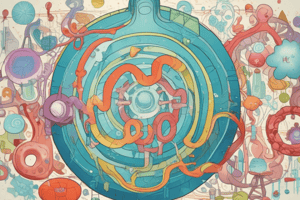Podcast
Questions and Answers
Which protein has a very long lifespan?
Which protein has a very long lifespan?
- Pepsinogen
- Trypsinogen
- Hemoglobin (correct)
- Rennin
What determines protein stability according to the text?
What determines protein stability according to the text?
- Presence of sulfur-containing amino acids
- Sequence of aromatic amino acids
- N-terminal amino acid residues (correct)
- C-terminal amino acid residues
Which enzyme cleaves the internal peptide bonds in which the carboxylic group is of aromatic amino acids or leucine?
Which enzyme cleaves the internal peptide bonds in which the carboxylic group is of aromatic amino acids or leucine?
- Chymotrypsin
- Trypsin
- Pepsin (correct)
- Rennin
Which cells produce pepsinogen?
Which cells produce pepsinogen?
What activates trypsinogen to form trypsin?
What activates trypsinogen to form trypsin?
Study Notes
Protein Longevity and Stability
- Ubiquitin has a very long lifespan due to its highly conserved sequence and lack of lysine residues, making it resistant to proteolytic degradation.
Protein Stability Determinants
- The stability of a protein is determined by its amino acid sequence, with certain sequences being more prone to degradation than others.
Peptide Bond Cleavage
- Cathepsin D is the enzyme responsible for cleaving internal peptide bonds in which the carboxylic group is of aromatic amino acids or leucine.
Pepsinogen Production
- Pepsinogen is produced by chief cells in the stomach.
Trypsin Activation
- Enterokinase activates trypsinogen to form trypsin.
Studying That Suits You
Use AI to generate personalized quizzes and flashcards to suit your learning preferences.
Description
Test your knowledge of protein turnover, catabolism of amino acids, and protein digestion with this biochemistry quiz. Learn about the synthesis and degradation of proteins, as well as the factors that determine protein stability.





